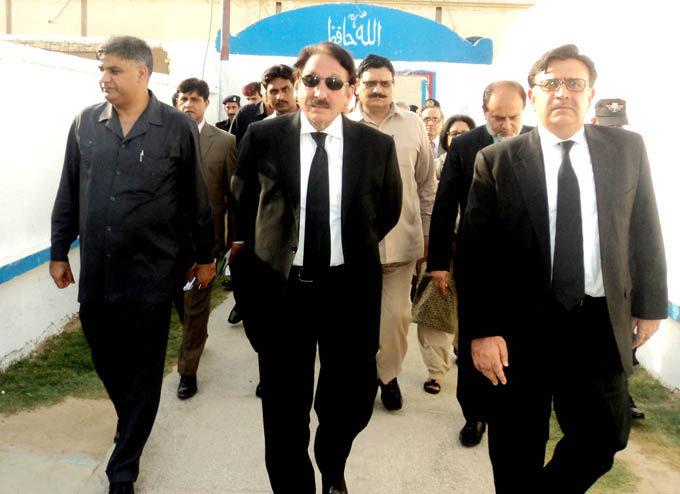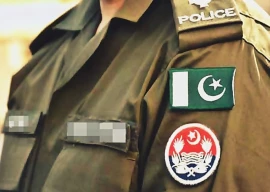
Though it was established back in 1988, when former prime minister Benazir Bhutto petitioned to the Supreme Court against Gen Ziaul Haq’s decision to hold elections on non-party basis, it has been particularly busy over the last few years. For example, no less than 45,040 complaints were filed with the HRC just between September 1, 2012, and September 7, 2013.
Despite having disposed of some 46,287 complaints in total over a year, a huge balance lance of 17,577 complaints still remain unaddressed and undecided.
Under Chaudhry’s tenure the HRC has reached new levels of activity.
Explaining the burden of work during Justice Chaudhry’s tenure, Akhtar Ali, who is assigned by the court to register cases as the advocate on record, recalled that “One day, I registered 1,500 cases filed under Article 184(3) of the Constitution. “I have seen many people praying for Justice Chaudhry while getting relief in chronic cases.”
But Chaudhry’s activism itself has precedent.
A senior official recalled the late Chief Justice Afzal Zullah and the broadened scope that he inculcated in the judiciary towards human rights-related cases in particular. “If someone wrote to him even on a match box, he would take action on it.”
Fittingly enough, that has been the chief criticism of the current chief justice, who will serve his last day in office on Wednesday.
Ali Ahmad Kurd, a prominent leader during the lawyers’ movement, was less diplomatic and went as far as to say that Justice Chaudhry took interest in activities that were “not the task of apex court”.
Not everyone agrees. Zafarullah Khan, executive director of Center for Civic Education, appreciated the court’s activism, saying that the courts have invoked human rights-related jurisdiction for the first time.
Advocate Ali held that the only reason for Iftikhar Chaudhry’s fame is the HRC. “Justice Chaudhry made the cell more vibrant and organized.” He said that during Chaudhry’s tenure thousands of applicants approached the court. However, Ali did recall that under Justice Zullah, the backlog had come to almost zero.
Legal experts cite Justice Chaudhry’s suo motu cases as the main reason for the huge backlog. For one, Justice (retd) Tariq Mahmood suggests the cases be equally distributed among different benches of the top court to clear the backlog. He said that Justice Chaudhry took on more than he could possibly manage. Senior Karachi lawyer Khalid Anwar suggests that only a limited number of cases should be fixed for a single day, which would help avoid inconvenience to litigants. Vice President of Pakistan Bar Council, Qalb-e-Hassan urged the judiciary to draft a procedure to undertake suo motu cases and limit jurisdiction.
Yet it is not as if the Supreme Court has been inactive in terms of deciding matters. It has disposed of 46,287 complaints from the HRC, and dealt with 18,927 cases from September 1, 2012 to September 6, 2013, despite adding 18,105 new cases.
The lower courts have also been on the move. From June 2009 to December 2010, about 1.75 million cases were pending before the lower and superior judiciary. Despite a submission of 3.2 million new cases, those pending were still reduced to about 1.35 million. In two years, a total of 5.7 million cases were decided while 5.5 million cases have been filed during the same period. The district judiciary has given decisions in almost all old cases taken up by the court up until December 31 2008.
As impressive as those numbers may seem, there’s still much to be done ahead. Aside from the 17,577 HRC petitions, there is a backlog of 20,911 cases in the Supreme Court alone – many of them relating to suo moto notices taken under Justice Chaudhry.
And that will be the challenge for new top judge Justice Tassadaq Hussain Jilani.
Published in The Express Tribune, December 11th, 2013.
COMMENTS (1)
Comments are moderated and generally will be posted if they are on-topic and not abusive.
For more information, please see our Comments FAQ
1732434981-0/BeFunky-collage-(10)1732434981-0-405x300.webp)




1732433856-0/Untitled-design-(6)1732433856-0-270x192.webp)
1732429143-0/BeFunk_§_]__-(44)1732429143-0.jpg)
1732428532-0/BeFunk_§_]__-(43)1732428532-0.jpg)

1732427746-0/Copy-of-Untitled-(2)1732427746-0-270x192.webp)







Human rights cell applies on alive humans, we are in need of the right of life !!